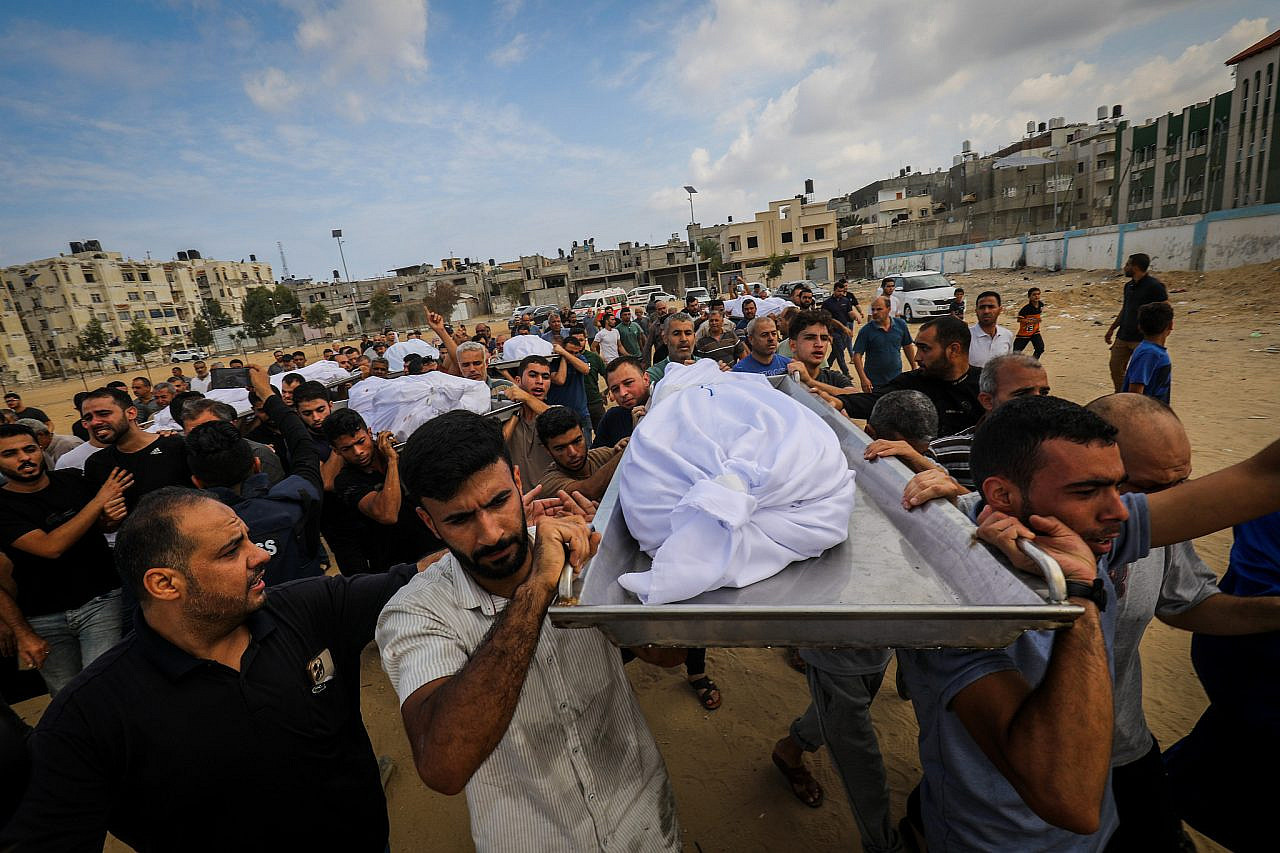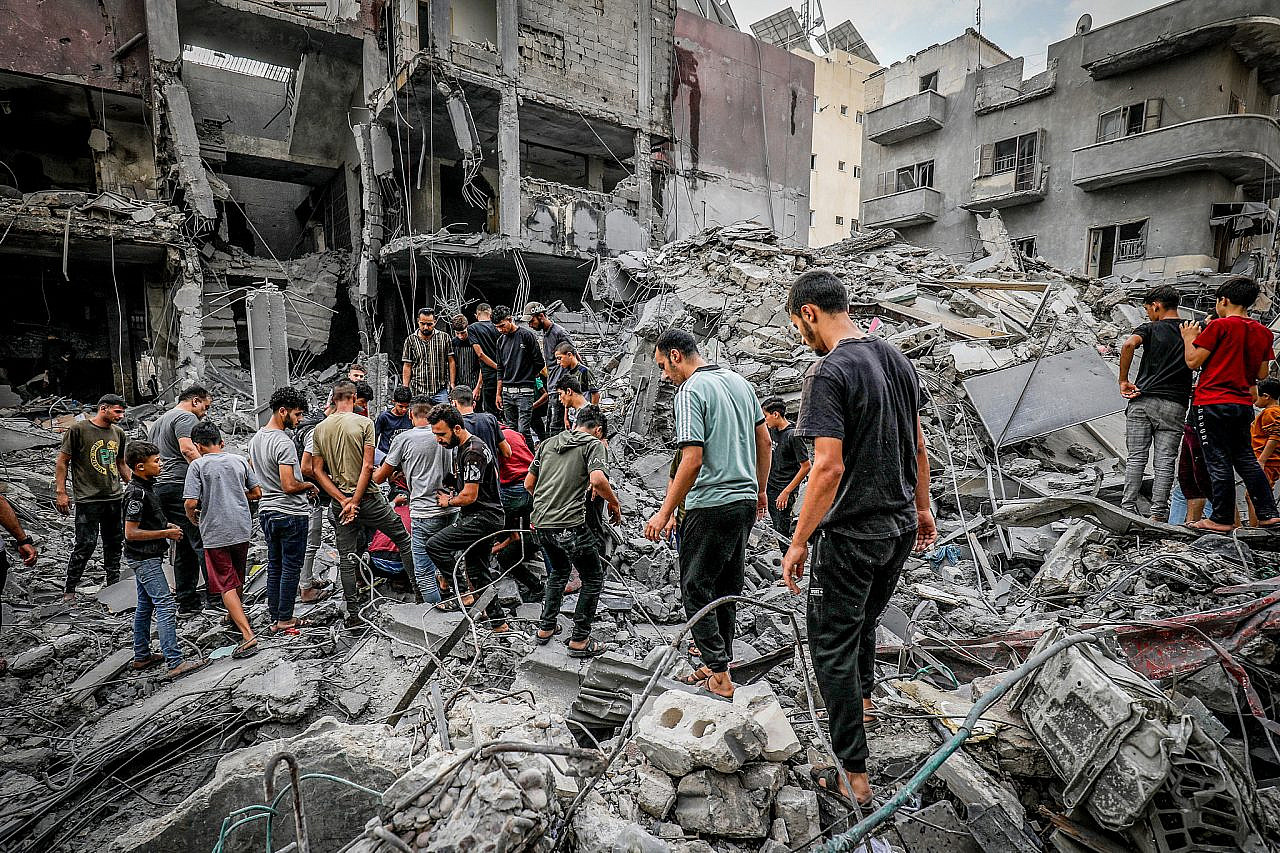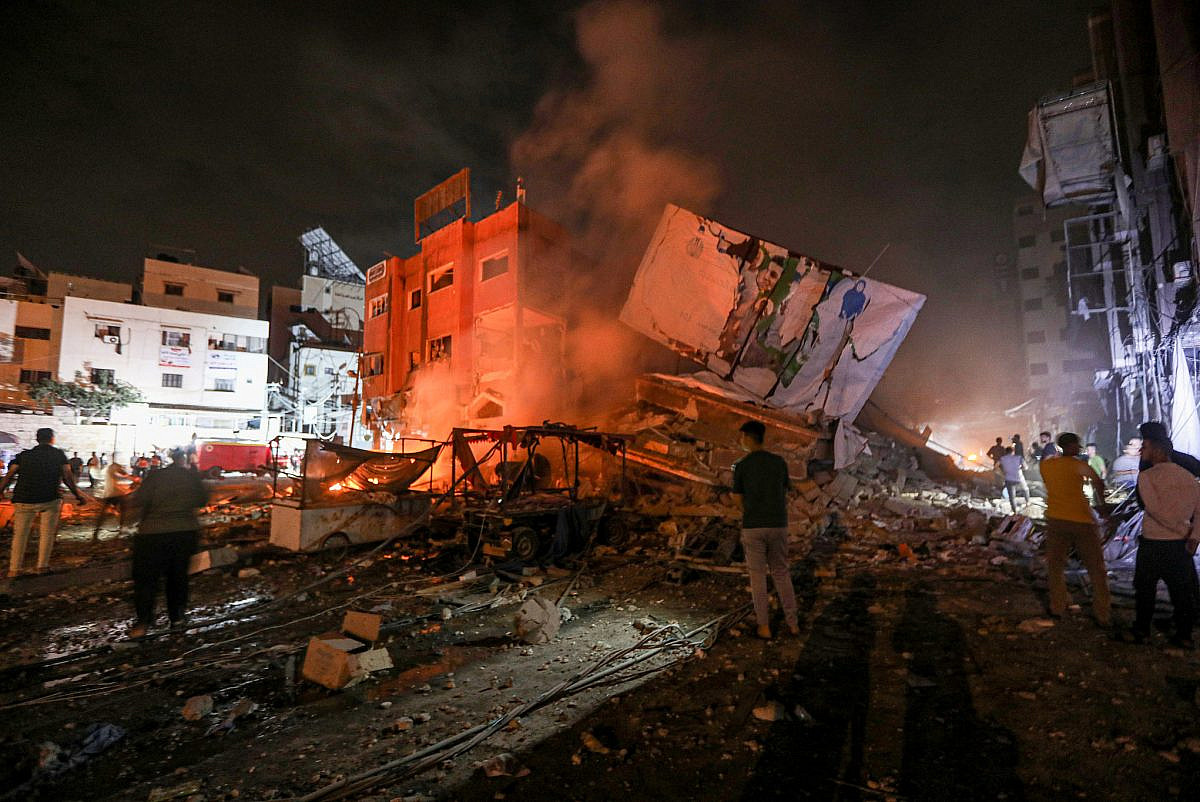With each passing day of Israel’s unprecedented assault on Gaza, it is becoming more difficult to be a journalist in the strip — caught between the non-stop missiles from the occupation’s warplanes, and the near-total loss of power since Israel sealed us off from the world entirely earlier this week. Early this morning, Israel ordered the 1.1 million residents who live in the north of the strip to flee south within the next 24 hours, cleansing the area of Palestinians in preparation for the army’s expected ground invasion. As the Palestinian death toll enters the thousands, I feel a duty to keep exposing the world to what Israel is doing here.
One of the cities in the southern part of the strip, toward which many are being forced to flee, is Khan Younis — but here, too, we’ve been experiencing heavy bombardment from the air as well as from shells fired by Israeli tanks since the early hours of Saturday morning, following Hamas’ shock raid across Israel’s separation fence. The number of people killed and wounded in this city alone is estimated to be in the hundreds. Refugees from the north have already started to arrive in their thousands; many more have stayed behind in the northern parts of the strip, unable or too afraid to leave.
Samira Qadeeh, a 50-year-old from Khuza’a — a town on the outskirts of Khan Younis and one of the closest Palestinian localities to Israel’s fence — fled her home with her family soon after the bombing began, fearing that the worst would befall them if they stayed put. “The tanks were shelling houses with civilians inside, as if they wanted to kill and erase us,” she said.
“All of the neighbors went out in big groups, the children crying and shrieking from the sound of the shells,” she continued. “I was screaming at people to walk quickly, lest the warplanes fire their missiles toward us.” They eventually found their way to a UN Relief and Works Agency (UNRWA) school in the hope that they’d be safer there, but with the scale of the destruction being wrought on the strip by Israel’s bombs, the terror still remains.
“It’s not easy to leave your home with your children, and move to an unknown place where you might not be able to sleep and might not have everything you need, but the Israeli occupation doesn’t care about that,” said Samira. “All it cares about is murder and displacement.”

Fourteen-year-old Salim Sa’eed is also from Khuza’a, and was at home with his two siblings when the shelling began. “We heard the booms and my sister wanted to look out the window to see if someone was celebrating with fireworks. But I felt that it was a bombardment and not a celebration, so I shouted at her to come inside in order not to get hurt. I sat with my little brother in one room and waited for my mother to come back. The sounds of the bombs never stopped.”
‘Nowhere is safe in Gaza, but we are trying to survive’
Two nights ago, in the deepest darkness, several families in Khan Younis were completely obliterated. The Al-Shaer and Al-Astal families lost a combined total of more than 20 people, including women and children. Ambulances and civil defense vehicles came looking for people to rescue, but there was nobody left alive.
Khalid Salem, 40, was a close neighbor of the Al-Astals. He was watching TV with his family, when they heard the almighty noise of a missile strike, which partially damaged their own house.
“I heard people screaming loudly outside,” he said. “I rushed out, and was shocked to find that the bombing had targeted the house of our lovely and friendly neighbors. I cried a lot when I heard someone screaming and calling for someone to save him.
“Ambulances and civil defense vehicles came to pull injuries and martyrs from the place,” Salem continued. “Everyone was screaming, all of us crying from the scenes we were watching. The most difficult thing you can ever witness is seeing your friends coming out as burned bodies.”

Salim Sabir, 35, left his home in the Abasan Al-Kabira area with his wife and four children in the early hours of Sunday morning. “The first night of the war was very difficult,” he said. “The sounds of consecutive missiles terrified my children. Some of them couldn’t go anywhere alone in the house, thinking that they would die alone or that we would die and leave them alone. These tragic thoughts that came to my children’s minds made me look for a safer place for them so that they won’t be hurt.”
Sabir and his family, like thousands of Khan Younis residents, sought shelter in UNRWA schools in the west of the city, which are usually considered among the safer places in Gaza — but at least 18 such schools around Gaza have already been badly damaged by Israeli strikes in recent days, two of which were being used as emergency shelters.
“The schools are not suitable for sleeping or staying for several days, but we don’t have alternatives,” said Sabir. “We need a lot of things like food, drink, blankets, and clothes. Furthermore, there are a large number of people here, and everyone is worried about their relatives and homes and scared about what is happening outside the school. Nowhere is safe in Gaza, but we are trying to survive the war.”
Amid all this, Khan Younis has been suffering from a power shortage since the first day of the war. This is a result of Israel tightening the siege it has imposed on the strip for the past 16 years, and preventing fuel supplies — and water — from entering. In the first four days of war, the power schedule was 3 hours on and 26 hours off, but on Wednesday, Gaza’s electricity authority declared that it was no longer able to keep the power plant running for even a few minutes. Private generators are now the only source of electricity, and these, too, will stop working soon.
Most read on +972
Laila Al-Khalid, 45, said that the power outage “doubles the suffering from the war.” “We are trying to feel safe by communicating with the world and talking to friends and relatives outside, but the power cut prevents that,” she explained. “The lack of electricity also leads to a water cut and we cannot do our daily chores. All of it creates a state of constant tension.
“The occupation aims to close off Gaza and isolate us from the world, so that no one can reach us and know what is happening here,” she continued. “This is an ugly policy, added to its longstanding policies of siege. The war, the sound of shells and missiles, and the scenes of martyrs of our friends and neighbors are very painful.”




